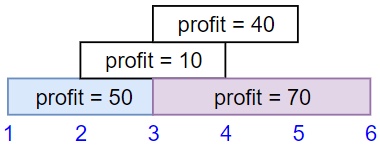1235. Maximum Profit in job scheduling¶
We have n jobs, where every job is scheduled to be done from startTime[i] to endTime[i], obtaining a profit of profit[i].
You're given the startTime , endTime and profit arrays, you need to output the maximum profit you can take such that there are no 2 jobs in the subset with overlapping time range.
If you choose a job that ends at time X you will be able to start another job that starts at time X.
Example 1:

Input: startTime = [1,2,3,3], endTime = [3,4,5,6], profit = [50,10,40,70] Output: 120 Explanation: The subset chosen is the first and fourth job. Time range [1-3]+[3-6] , we get profit of 120 = 50 + 70. Example 2:

Input: startTime = [1,2,3,4,6], endTime = [3,5,10,6,9], profit = [20,20,100,70,60] Output: 150 Explanation: The subset chosen is the first, fourth and fifth job. Profit obtained 150 = 20 + 70 + 60. Example 3:

Input: startTime = [1,1,1], endTime = [2,3,4], profit = [5,6,4] Output: 6
Constraints:
1 <= startTime.length == endTime.length == profit.length <= 5 * 10^4 1 <= startTime[i] < endTime[i] <= 10^9 1 <= profit[i] <= 10^4
Analysis¶
For this problem, we cannot use greedy algorithm, since each interval's contribution isn't uniform (not all 1), so we need dp to solve. Different from classic dp problem, which we need to store all the timestamp, in this problem, we just care about the timestamp that is one of the ending time of any task. For example:
// if t is between two interval (w/o any intersection), dp[t] is equal to [dp[job1.end], dp[job1.start]], we don't need to record all the timestamp
job1: -----[ t ]
job2: ------
Now we can define our dp[i] as maximum profits from (0, i] timestamp. We can derive that for any dp[i]: * if we choose to take job x, dp[x.end] = dp[last job end before x.start] + job x's profit * if we choose not to take job x, dp[x.end] = dp[last job's end]
Our answer will be dp[last job ending time].
Time: O(n \log(n)) for sorting, O(n \log(n)) for search last job ending (choose case from dp) Space:O(n) we need to store all the interval in the map.
Code Link¶
class Solution {
public:
int jobScheduling(vector<int>& startTime, vector<int>& endTime, vector<int>& profit) {
int n = startTime.size();
vector<vector<int>> jobs;
for (int i = 0; i < n; ++i) {
jobs.push_back({endTime[i], startTime[i], profit[i]});
}
sort(jobs.begin(), jobs.end()); // sort by ending time
map<int, int> dp = {{0, 0}};
for (auto job : jobs) {
// find the last ending which end before current start time, so that we can schedule current job
int last_ending_profit = prev(dp.upper_bound(job[1])) -> second;
// if by adding current job will cause a higher profit, we can update current ending time's profit
if (last_ending_profit + job[2] > dp.rbegin() -> second)
dp[job[0]] = last_ending_profit + job[2];
}
return dp.rbegin() -> second;
}
};
Misc¶
In c++, dp.rbegin() will return the last sorted pair from map, whereas dp.end() should return an empty nothing. source: http://www.cplusplus.com/reference/map/map/end/